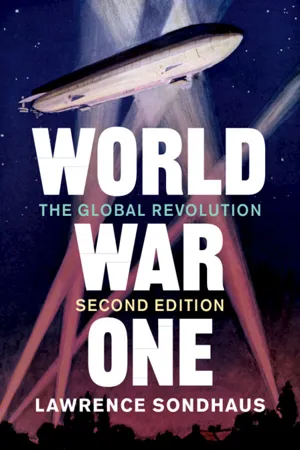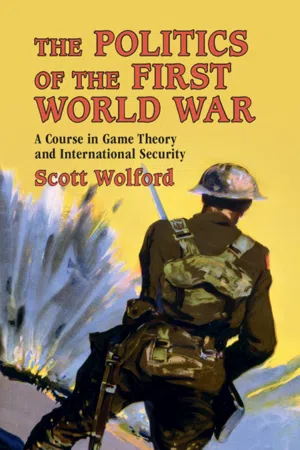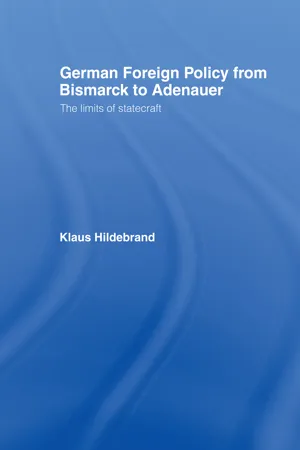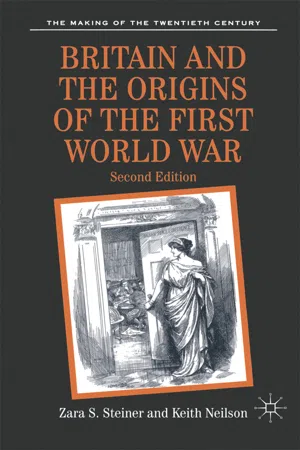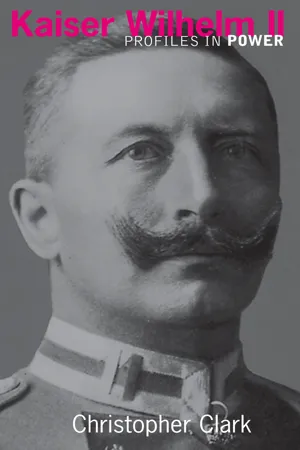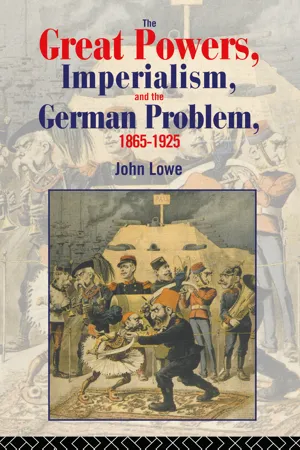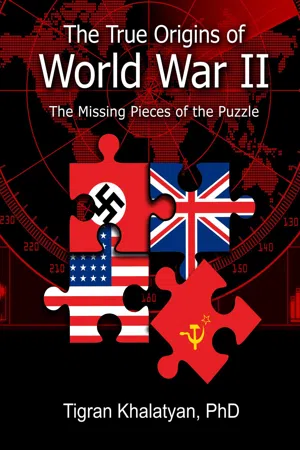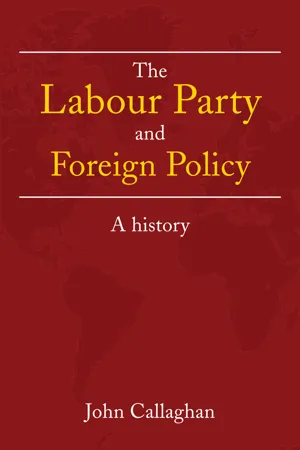History
July Crisis
The July Crisis refers to the diplomatic and military escalation of tensions in Europe in July 1914, which ultimately led to the outbreak of World War I. It was triggered by the assassination of Archduke Franz Ferdinand of Austria-Hungary and his wife in Sarajevo on June 28, 1914, and the subsequent series of ultimatums and declarations of war among the major European powers.
Written by Perlego with AI-assistance
Related key terms
1 of 5
11 Key excerpts on "July Crisis"
- eBook - PDF
World War One
The Global Revolution
- Lawrence Sondhaus(Author)
- 2020(Publication Date)
- Cambridge University Press(Publisher)
The July Crisis, 1914 2 June 28 Black Hand assassinates Archduke Francis Ferdinand at Sarajevo. July 3 Serbia makes first overture to Russia for aid. July 5–6 “Hoyos Mission” to Germany secures “blank check” for Austria- Hungary. July 16–29 France’s Poincaré and Viviani visit Russia. July 23 Austria-Hungary issues ultimatum to Serbia. July 25 Serbia rejects key parts of ultimatum; Austria-Hungary declares war (July 28). July 31 Russia mobilizes against Austria-Hungary and Germany. August 1 Germany orders general mobilization, declares war on Russia; France orders general mobilization. August 2 Italy declares neutrality. August 3 Germany declares war on France. August 4 Germany invades Belgium; Britain declares war on Germany. August 6 Austria-Hungary declares war on Russia. the July Crisis, 1914 36 Of all the international crises in history, none has been subjected to greater scru- tiny or more scholarly analysis than the July Crisis of 1914, which began with the assassination of Archduke Francis Ferdinand at Sarajevo on June 28 and culmi- nated in the great powers of Europe exchanging declarations of war beginning on August 1. As soon as the war began, the governments of the individual countries sought to construct a record of the diplomatic machinations that defended or justi- fied their actions and placed the blame elsewhere: Austria-Hungary against Serbia; Russia against Austria-Hungary; Germany against Russia; France and Britain against Germany. Historians likewise began to analyze the July Crisis while the war was still underway, touching off a protracted debate that would remain alive at the war’s centennial (see Perspectives 2.1, 2.2). - eBook - PDF
The Politics of the First World War
A Course in Game Theory and International Security
- Scott Wolford(Author)
- 2019(Publication Date)
- Cambridge University Press(Publisher)
18 Yet a local crisis over a cross-border assassination in the backwater of Southeastern Europe in 1914, a region and a time in which assassinations weren’t uncommon, 19 morphed in a matter of weeks into a confrontation involving the Continent’s major military powers. How was it that a long, bloody war of attrition that spanned the globe and destroyed the very empires participating in it should have been the result of the July Crisis? Why was Russia, committed to the monarchical principle and working hard to recover from recent defeat by another great power, willing to cut short its convalescence over the fate of a few Bosnian Serb regicides? Why did Germany, guarded by the best army on the Continent and wealthier than many of its competitors, embark on 17 For the discussions that produced the blank check, see Documents 119, 120, and 130, in Mombauer ( 2013 , chapter 6 ). 18 See Chapter 11 for more on economic interdependence and war. 19 See Clark ( 2012 , chapter 1 ). 78 4 Leaping into the Dark: Europe Goes to War a war in support of an unreliable Austrian ally that would pit it against Russia, France, and (unless everything went right) the United Kingdom? puzzle 4.1 Why did a local dispute between Austria and Serbia expand into a costly war between the other great powers? It’s easy after the fact to look at the July Crisis and pin “blame” for the ensuing world war on nearly every party. Contemporary politi-cians and scholars in subsequent generations have done just that. Follow-ing a tradition associated with German historian Fritz Fischer, 20 some lay sole responsibility for the war at Germany’s feet, arguing that its leaders resolved in 1912 that war – and only war – could solve problems of termi-nal diplomatic encirclement and fraught domestic politics. 21 Others point a finger at Russia, reading the secrecy of its initial mobilization measures as unwillingness to deter German mobilization during the height of the cri-sis. - eBook - ePub
German Foreign Policy from Bismarck to Adenauer
The Limits of Statecraft
- Klaus Hilderbrand(Author)
- 2013(Publication Date)
- Routledge(Publisher)
100 Russia set in motion the mechanism which was to trigger major war.(5) As the Triple Entente gained the upper hand in the rivalry between the blocs after 1911, Austria-Hungary and Germany were forced on to the defensive. The foreign policy of the Habsburg monarchy was greatly influenced by these developments during the July Crisis, when it followed different policies to those adopted in the Balkan crisis of 1912–13. The growth of Russian armaments, threateningly displayed in the Russian army manoeuvres of June 1914, created added pressure on Austria-Hungary. Foreign Minister Berchtold responded with a diplomatic offensive which was the product of a fear for the very existence of the Habsburg monarchy.101 The creation of the Balkan League,102 which Vienna regarded as a Russian weapon against Austria-Hungary,103 provoked a strong and horrified reaction in Vienna.Berchtold was afraid that a lack of harshness on the part of the Dual Monarchy during the July Crisis would lead the German Reich to abandon Austria-Hungary. Against the will of Conrad von Hötzendorf, Chief of the General Staff, Berchtold therefore insisted on the bombardment of Belgrade by the Austrian artillery on 29 July 1914, an act which was militarily senseless. Yet his fears had some foundation. The Russians were speculating on the possibility of an agreement with Germany to the detriment of the Dual Monarchy; even Bethmann Hollweg considered this Bismarckian notion for a fleeting moment during the course of the July Crisis.The assassinated heir to the throne of the Dual Monarchy, Franz Ferdinand, had originally agreed with Conrad von Hötzendorf that war against Serbia was desirable, and had even recalled him to office. However, after the Adriatic crisis the archduke became a resolute advocate of a peaceful solution to the problems of the monarchy in south-east Europe. He had begun to work for von Hötzendorfs replacement, since he had no wish to become involved in a major war as a result of Serbia’s links with Russia. Franz Ferdinand had come to see such a conflict as ‘madness’ which would only ‘clear the way for revolution’104 in domestic affairs. Yet even before his assassination, Austria-Hungary had decided on an aggressive Balkan policy which would inevitably make a peaceful solution to future crises in south-east Europe more difficult to achieve. The outlines of the policy can be seen, for example, in the memorandum drawn up by Councillor (Sektionsrat) Franz von Matschenko105 before 24 June 1914. After the assassination, Vienna’s decision to go on the political offensive in the Balkans was implemented by Foreign Minister Berchtold by means of Count Hoyos’s mission to Berlin on 5–6 July. Austria-Hungary had been driven into a corner; urged on by Germany, it sought a solution in a Flucht nach vorn - Zara S. Steiner, Keith Neilson(Authors)
- 2017(Publication Date)
- Red Globe Press(Publisher)
It was only in the Foreign Office that the season was a calm one. The shooting of Franz Ferdinand by Gavrilo Princip, a Bosnian living in Serbia, at Sarajevo on 28 June, transformed the European scene only with time. Berchtold knew that a demonstration of power must ensue if Austria–Hungary was to retain her great power status. In this sense, Sarajevo was the cause for war. The Germans were equally determined that their ally should be backed but that Vienna should get on with a solution to the Serbian prob-lem as quickly as possible. The weeks between the assassination and the British declaration of war on 4 August have probably been studied as intensively as any single period in European history. Only a daily calendar of events would catch the sense of rising tension and illustrate the interaction between all the capitals which ended in the breakdown of the European state system. Historians have repeatedly asked why the traditional machinery which had worked so often in the past failed in this particular instance. There were the intentions of the powers concerned. There was also an important time factor. Once the Austrians declared war and bombarded Belgrade, the military men began to think in terms of bringing their mass armies and elaborate railway schedules into action. The chiefs of staff in each country believed that the conflict THE July Crisis 233 would be a ‘short, cleansing thunderstorm’ and that ‘the troops would be home by Christmas’. The assumption of a swift and deci-sive clash of arms put a premium on rapid mobilisation and the opening of the offensive. Yet it was only in Berlin that the ‘time-tables in A. J. P. Taylor’s sense, took over. 16 It is true that the Russian decision on 30 July to mobilise automatically turned the fight over Serbia into a European war. Either partial or full mobil-isation would have had the same effect in Germany. Here, where the Schlieffen plan depended on a rapid move of the armies into France, mobilisation meant war.- eBook - ePub
- Christopher Clark, Christopher (St Catherine'S College, University Of Cambridge) Clark(Authors)
- 2013(Publication Date)
- Routledge(Publisher)
Chapter 7 From Crisis to War: 1909-1914As we approach the outbreak of the First World War, the task of weighing Wilhelm's impact on events becomes increasingly difficult. The narrative of his reign intersects at this point with one of the most complex and ramified debates in the historiography of modern Europe. It is impossible to assess Wilhelm's role without touching, at least in passing, on debates over the character of German diplomacy during the Balkan crises, the nature and significance of German 'planning' for war before 1914, the German contribution to the escalation of the Austro-Serb conflict of 1914 and the failure to avert a catastrophe when war was clearly imminent. And there is a further problem of perception as we draw near the brink of the disaster of August 1914: every bellicose marginal note, every call for increased naval or military expenditure appears - in retrospect - to be pregnant with ominous meaning. Like objects nearing the threshhold of a black hole, decisions, written comments, even throwaway remarks, gain gravity, or appear to do so from our posterior vantage point. It thus becomes doubly important to set speech and action in context. This general observation applies in a very specific way, as we shall see, to Wilhelm II.Wilhelm, Austria-Hungary and the Balkans
In the string of diplomatic conflicts that stirred European diplomacy during the last decade of peace, two regions loom especially large: Morocco and the Balkans. Wilhelm had never shown a serious interest in northern Africa. By contrast, the Balkan crises that culminated in the outbreak of war in 1914 raised issues that had long been central to his view of an effective and honourable German foreign policy. Wolfgang Canis and Lamar Cecil have emphasised the consistency with which Wilhelm assured the Austrians that he would support them in their various Balkan entanglements.1 In view of the catastrophic dénouement of 1914, when Germany went to war at Austria’s side, Canis has suggested that Wilhelm’s longstanding commitment to the Austrian alliance partner should be seen as a fatal liability for German policy and a demonstration of the ‘existential danger posed to the Reich by the continuity of this Kaiser’s power’.2 - eBook - ePub
The Culture of Time and Space, 1880–1918
With a New Preface
- Stephen Kern(Author)
- 2003(Publication Date)
- Harvard University Press(Publisher)
In the traditional assessment that old is good, England, France, and Russia would appear morally superior to the newer creations of the decade of the 1860s. No doubt one of the reasons German leaders wanted to place responsibility for the outbreak of the war onto either Russia or France came from a deep sense that they had to establish their moral credentials. As heirs to the Holy Roman Empire, Germany and Austria had some sense of their ancient heritage, but that lineage had been repeatedly interrupted by dynastic and territorial changes. The historicism of Hegel, Darwin, and Marx had taught that all things emerge and ripen in time as a composite of what has gone before. England, France, and Russia could look back on relatively continuous growth of national institutions and draw strength from their long and rich patrimony. The patina of time lay thick on the older nations of Europe and gave them an aspect of genuineness; the Central Powers were newcomers held together by the newly fabricated skin of German armor.While distinctive past orientations of the five major belligerents shaped their expectations about the future, the exigencies of the present during the July Crisis tended to work on all of them more or less alike. The present was a parenthesis of time between a glorious and prosperous European past and an uncertain future, when diplomats spoke and acted for nations under circumstances of extraordinary temporal compression. This was the climax of the age of simultaneity. Telegrams sent to half a dozen capitals triggered a variety of responses simultaneously. Telephones carried instantaneous two- and three-way conversations. The compacting of events in time was best suited for the one new art form of the period—the cinema—that was able to suggest the multiplicity of occurrences in many distant places in a single moment. The July Crisis was a montage of the simultaneous activity of scores of diplomats and later, of millions of soldiers. Each nation had a unique perspective and a different stake in the outcome, but the sense of the present was generally similar—thickened for all by the sheer density of events and expanded spatially by the new technology. Far different was the sense of the future, which determined why and how the various nations finally went to war.Of all the belligerents England was the most conservative and had the least expectation of a radically new future. Its interest was in preserving the status quo and the greatness of its empire. The English were hopeful, if not absolutely certain, that the future would continue to resemble the past. As A. J. P. Taylor observed, “In England landowners granted leases for 99 or even 999 years, equally confident that society and money would remain exactly the same throughout that time.”52 - eBook - ePub
- Dale C. Copeland(Author)
- 2013(Publication Date)
- Cornell University Press(Publisher)
[4]
The July Crisis and the Outbreak of World War I
In this chapter I argue that Germany actively sought war in July 1914 and that German leaders by the end of July preferred world war to a negotiated peace, even to one that gave Austria most of what it wanted. Berlin thus took all steps necessary to prevent any kind of negotiated solution, while at the same time ensuring that Russia was blamed for the war. This argument goes a few steps beyond Fritz Fischer, whose view that Germany preferred continental war over a return to the status quo sparked a heated controversy that is still with us.1 Fischer contends that Bethmann Hollweg, the German chancellor, expected Britain to remain neutral, and would not have pushed Austria against Serbia had he known that Britain would intervene. Moreover, Fischer is vague as to whether Germany preferred a localized war giving Austria a victory over Serbia to a continental war.2Chapter 3 demonstrated that German leaders, including Bethmann, saw the chance of Britain remaining neutral as very low given Britain’s balance-of-power tradition. Hence, while they certainly preferred continental war to world war, and while diplomacy in a crisis might help keep Britain out—at least in the early stages of war—it is clear that no leader in Berlin counted on British neutrality in pursuing a hard-line strategy. In this regard, I seek to explode one of the most persistent myths surrounding the First World War, namely, that Bethmann and his associates got cold feet on 29 July when they realized that Britain would fight for France. Even Fischer accepts this view of 29 July, and thus like Luigi Albertini falls back on the notion that things got out of hand after that date. As I show, however, Bethmann knew two days earlier that little hope remained that London would stay out of the war. In the face of this knowledge, he simply continued forward. In short, given a choice between world war and a negotiated peace, the German leadership preferred the former and did nothing to achieve the latter. - John Lowe(Author)
- 2013(Publication Date)
- Routledge(Publisher)
carte blanche to pursue an expansionist policy in the Balkans from 1912, while tightening the bonds of the Franco-Russian alliance. The evidence for this, however, is not very clear-cut. What does seem incontrovertible is that French diplomacy was over-assertive in St Petersburg during the July Crisis and unduly temporizing in Paris and Berlin.For most French people, politicians and public alike, the ‘crisis’ in July 1914 centred around the trial of Madame Caillaux, which dominated the pages of the French press. That the wife of the minister of finance had shot dead a newspaper editor who had published her love letters was quite a juicy scandal in itself. The crucial aspect of the trial, however, was the danger of revelations of diplomatic intercepts, which could have had serious political and international repercussions. It was not simply that, in terms of its newsworthiness, the assassination of a not very popular archduke (a not uncommon event) was comparatively speaking pretty small beer, but that the Sarajevo incident had no obvious bearing on French interests. Before the middle of July, therefore, there seemed no occasion for alarm in Paris and no reason to cancel the state visit to St Petersburg of the president and prime minister. Consequently, from 15 to 29 July Poincaré and Viviani were largely out of touch with developments. What they discussed with Sazonov in the course of their visit to Russia on 21–3 July remains conjecture, since no official record of the talks was made. Meanwhile, the group of inexperienced ‘second-raters’ left in charge of French diplomacy in Paris gave the German and Austrian ambassadors to understand that France would not object to retaliatory action against Serbia.- eBook - ePub
Between Peace and War
40th Anniversary Revised Edition
- Richard Ned Lebow(Author)
- 2020(Publication Date)
- Palgrave Macmillan(Publisher)
Recent works on the origins of World War I see these developments as important underlying causes because they made leaders of the great continental powers more insecure, more aggressive, and more favorably disposed, if not to war, to the kind of risk-taking that made it more likely. 22 These pressures mounted in the six months before the July Crisis. Perhaps the most critical step of the crisis was German encouragement, actually pressure, on Austria to draw the sword against Serbia. The Austrian ultimatum to Serbia set in motion a chain of events that led ineluctably to war. On three earlier occasions in the previous two years, the same German leaders had sought to restrain Vienna. Context was all important. The importance of context does not rule out generalizations across cases but does mean that international relations scholars must carefully construct their propositions and data sets to take into account the research of historians and their identification of key features into account. This will complicate comparisons and rule them out in some instances. Elsewhere, I have argued that it greatly reduces the utility and authority of any generalization based on cross-case comparisons. Such generalizations should be regarded as nothing more than starting points for narrative explanations or forecasts that fold in context. 23 The cumulative analyses of World War I create a second related problem. Historians have identified what they consider to be a number of political, military, social, and ideational causes of war. They include nationalism, alliance systems, commitments to preserving honor, and Social Darwinism. The most recent accounts do not proposes “causes” that have not previously been mooted, and there is relatively minor reevaluation of the relative importance of what has traditionally been considered the most important underlying ones. Historians tend not to rank underlying causes but most often describe them as reinforcing - Available until 7 Jul |Learn more
The True Origins of World War II
The Missing Pieces of the Puzzle
- Tigran Khalatyan, Dan Crissman(Authors)
- 2021(Publication Date)
- Tigran Hobbies LLC(Publisher)
If the justification for war was redefined three years into the fighting, why did the war actually start? In August 1914, nations plunged into the First World War without a second thought. As a rule, enthusiastic masses cheered on the troops going to the front in patriotic fervor. The public in almost every country was sure that the war would be short and with little casualties. Nothing could have been farther from the truth…The July CrisisOn June 28, 1914, the heir to the Austro-Hungarian throne, Archduke Franz Ferdinand (1863-1914) and his wife Sophie were shot dead in the streets of Sarajevo, Bosnia. The assassin, Bosnian Serb student Gavrilo Princip (1894-1918), was a member of a separatist organization with alleged ties in Serbia. In the heart-breaking scene, Franz and Sophie died after a short agony. “For God’s sake, what has happened to you?” asked Sophie before losing consciousness. Franz implored “Sophie dear, Sophie dear, don’t die! Stay alive for our children!”The assassination was probably directed by the infamous Serbian colonel Dragutin Dimitrijević (1876–1917), also known as Apis, who in 1903 organized a military coup that resulted in the brutal murder of the previous Serbian King and Queen. The intended aim was to further the cause of Serbian nationalism, but the Archduke and his wife ended up being the first casualties in a global conflict.However, wars do not start because brutal terrorists provoke them. It’s the other way around. ”Civilized” governments routinely use the acts of terror as an excuse to start wars that had been long planned. The United States used the terrorist attacks on September 11, 2001 as justification for the 2003 war in Iraq, even though Iraq played no role in the attacks.The start of the First World War that followed the assassination in Sarajevo was also confusing, as the governments tried to hide their true motives. It went like this: Instead of an immediate action, outraged Austria waited a month to declare war on Serbia. The next day, July 29, Russia started general mobilization, but cancelled it few hours later. They reversed course yet again on July 30, and general mobilization commenced. On August 1, Germany declared war on Russia and then … moved its troops in opposite direction towards the French border. France, a Russian ally, started to mobilize as well, but did not declare war on Germany outright. On August 3, Germany declared war on France and invaded Belgium. On August 4, England declared war on Germany for violating Belgium neutrality, which England had promised to protect in a treaty dating back to 1839. Finally, on August 6, Austria declared war on Russia, as if to remind everyone that the war actually started because of already forgotten Austro-Serbian conflict. More declarations of war would follow later as various countries around the world tried to benefit from the quarrel. - eBook - ePub
The Labour Party and Foreign Policy
A History
- John Callaghan(Author)
- 2007(Publication Date)
- Routledge(Publisher)
There was no suggestion that such a war could be a just war, or a war of national defence, or that opinion on the war would be influenced by who started it, who was right or wrong or that it mattered who won or lost the war. As the July Crisis unfolded the socialist press in Europe warned against a general conflagration. On 25 July, the day Austria–Hungary declared war on Serbia, Vorwarts correctly anticipated the way the alliance system could lead to this very outcome. 3 Militarism and secret diplomacy were indicted by all and every one of the principal leaders who attended the Bureau of the International when it met to consider the problem in Brussels on the 29th. A successful open-air mass meeting only served to disguise the fact that no practical decisions were taken other than to call for more demonstrations. The Parliamentary Labour Party (PLP) met on 30 July to express its support (as Jean Jaurès had done at Brussels) for Sir Edward Grey’s attempts to mediate between Serbia and Austria and to say that ‘on no account will this country be dragged into the European conflict in which, as the Prime Minister has stated, we have no direct interest, and the Party calls upon all Labour organisations in the country to watch events vigilantly so as to oppose if need be in the most effective way any action which may involve us in war’. 4 Under the auspices of the British Section of the International Socialist Bureau, a demonstration was held in Trafalgar Square on 1 August to oppose war and a manifesto was issued to the same effect. Keir Hardie and Arthur Henderson both called for peace. MacDonald met Grey on 3 August, the day when British mobilisation began, with instructions to ask that everything should be done to keep Britain out of a European war. War was nevertheless declared the next day in the traditional way – with no reference to Parliament. On 5 August Labour’s Executive blamed this outcome on secret diplomacy
Index pages curate the most relevant extracts from our library of academic textbooks. They’ve been created using an in-house natural language model (NLM), each adding context and meaning to key research topics.
